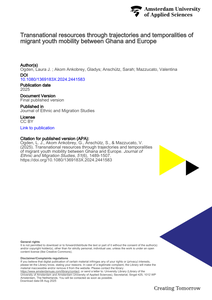Increasing youth travel has led to young people being labelled as ‘nomads’. This paper examines the phenomenon of youth nomadism in the tourism literature as well as examining recent empirical evidence. A review of the literature around youth nomadism identifies two major themes: analyses of the growth and development of youth travel niches, such as backpacking, volunteer tourism and educational exchange, and broader approaches linked to the rise of the mobilities paradigm. A major global survey of youth travel (34,000 respondents) indicates three major travel styles related to different forms of ‘nomadism’: the backpacker, the flashpacker and the global nomad. The traditional backpacker can be seen as a form of ‘neotribe’, gathering in self-sufficient enclaves. In contrast, the flashpacker, or ‘digital nomad’, utilizes existing digital and logistic infrastructure to maintain a fluid, individualized lifestyle. The global nomad, or ‘location independent traveller’, tries to integrate with the local community, while trying to avoid the strictures of ‘system’.
LINK
Research on migrant youth makes two longstanding assumptions: that they are immobile following their own or their parents’ migration and that their resource environments are confined to their country of residence. Recent investigations of transnational youth mobility question both assumptions, showing that migrant youth – including the first and second generations – are highly mobile, and that their mobility has multiple impacts on their lives. This paper seeks to add to this growing literature by conceptualising as ‘transnational resources’ the perspectives, values, knowledge, and skills that migrant youth gain from their mobility between their countries of origin and residence and which become meaningful in various aspects of their multi-local (or what we call transnational) lives. Drawing on ethnographic data with 81 young people who are mobile between Ghana and three European countries (Belgium, Germany, and the Netherlands), we analyse the three main transnational resources we identified – enhanced sense of self, adaptability, and future outlook. Engaging the dual analytical lenses of temporalities and trajectories, we show both how transnational resources are gained through embodied mobility experiences and how they become meaningful in migrant youth’s lives across time and space.
DOCUMENT
